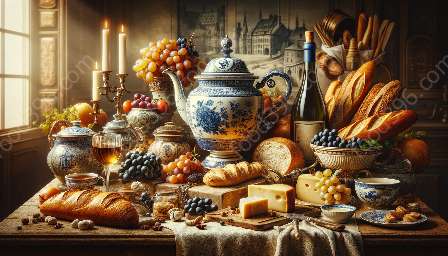French culinary techniques and methods have had a profound impact on the world of gastronomy, shaping the way we cook and appreciate food. The rich history of French cuisine is intrinsically intertwined with the development of these techniques, creating a culinary legacy that continues to inspire chefs and food enthusiasts around the globe.
French Cuisine History
To understand the intricacies of French culinary techniques and methods, it's essential to explore the history of French cuisine. French cuisine has its roots in the Middle Ages, with influences from Roman, Moorish, and Italian culinary traditions. It was during the Renaissance and the reign of King Louis XIV that French cuisine began to evolve into an art form, with the establishment of guilds, culinary schools, and the codification of techniques.
Cuisine History
French culinary techniques and methods are part of a broader culinary history that spans cultures and continents. The evolution of cooking methods and the exchange of culinary knowledge have shaped the diverse cuisines we enjoy today. Understanding the historical context of French culinary techniques allows us to appreciate their global influence and enduring legacy.
Classic French Culinary Techniques
French culinary techniques are renowned for their precision, elegance, and emphasis on preserving the natural flavors of ingredients. Some of the classic French culinary techniques include:
- Knife Skills: Mastery of knife skills is essential in French culinary tradition, with precise and uniform cuts being a hallmark of professional chefs.
- Sauce Making: The mastery of creating foundational sauces, such as béchamel, velouté, and espagnole, is a cornerstone of French culinary artistry.
- Pastry and Baking: French pastry and baking techniques have set the standard for delicate pastries, breads, and desserts worldwide.
- Butchery: French butchery techniques emphasize utilizing the whole animal and maximizing flavor through precise cuts and preparation.
- Flavor Pairings: French cuisine is highly regarded for its meticulous approach to flavor combinations, creating harmonious and balanced dishes.
Modern Innovations and Adaptations
While traditional French culinary techniques remain foundational, modern chefs have also embraced innovation and adaptation. The fusion of global flavors, the use of modern cooking technologies, and the incorporation of sustainable practices reflect the evolution of French culinary artistry in the 21st century.
Impact on Global Gastronomy
The influence of French culinary techniques and methods on global gastronomy cannot be overstated. From haute cuisine to casual dining, the principles of French culinary artistry have permeated culinary practices worldwide, shaping the way food is prepared, presented, and enjoyed.
Celebrating French Culinary Heritage
Exploring the world of French culinary techniques and methods is a celebration of a rich heritage that continues to inspire and captivate. Through understanding the historical context, embracing classic techniques, and innovating for the future, the legacy of French culinary arts endures as a testament to the power of food as an art form.

